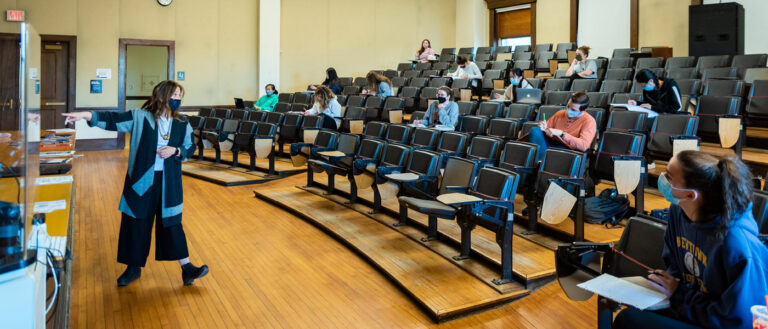Associate Professor Lauren Calandruccio, who specializes in auditory perception in the Department of Psychological Sciences, shared that while wearing masks is critical during this time, increased effort is required when listening to someone who is speaking with a mask. Wearing a mask while speaking can increase the effort required to hear and impact how much is actually heard.
This problem is significantly worse for people who are deaf and/or hard-of-hearing and for people listening to their non-native language. Background noise and reverberation worsen the problem.
The primary concerns for teaching and learning with masks on include:
- Reduced intelligibility (The listener actually doesn’t hear what is being said.)
- Increased listener fatigue (Increased mental effort is required to listen, causing the listener to tire quickly.)
- Decreased memory of degraded speech (It is harder to remember what you’ve heard when the signal is poor.)
To facilitate teaching and learning while wearing a mask, instructors should consider the following tips:
- Ask students if they can hear you before you begin your remarks. It’s recommended to ask before every class. Tip: Use an app, a Google form or Zoom poll to allow students to answer anonymously.
- If a student indicates something was hard to hear, don’t repeat it verbatim. Rephrase, slow down, speak up and use a microphone if possible.
- Speak more slowly. Allowing students more time to process what is being said will help them better understand and retain what they’ve heard.
- Be aware of the additional mental energy required to listen to speech that isn’t clear and support students with additional resources and compassion.
To facilitate learning while the speaker is wearing a mask, students should consider the following:
- Advocate for yourself! Communicate with instructors if it’s difficult to hear and/or understand them with their mask on. Politely recommend what might help.
- If you are deaf and/or hard-of-hearing, be sure to register with Disability Resources so the university can support your learning appropriately.
- If you benefit from an assistive listening device, such as a remote mic system, please use it!
- If you don’t have difficulty hearing in class, take good notes and offer to share them with your classmates who may be struggling.
- Be mindful of your mental health. Learning can be exhausting under ideal circumstances. If you are tired, take a break and rest.
To request accommodations please contact Disability Resources at disability@case.edu.
Do you have other questions? Contact Lauren Calandruccio at hearingresearch@case.edu.
For additional information, check the following resources:
- Tips for Communicating with the Deaf Community when Wearing a Face Mask
- 10 Tips for Managing Face Masks and Hearing Loss
- Best Practices for Wearing Masks When Communicating with Deaf and Hard of Hearing People
- Communicating Effectively While Wearing Masks and Physical Distancing
- Communicate Better While Wearing a Face Mask

